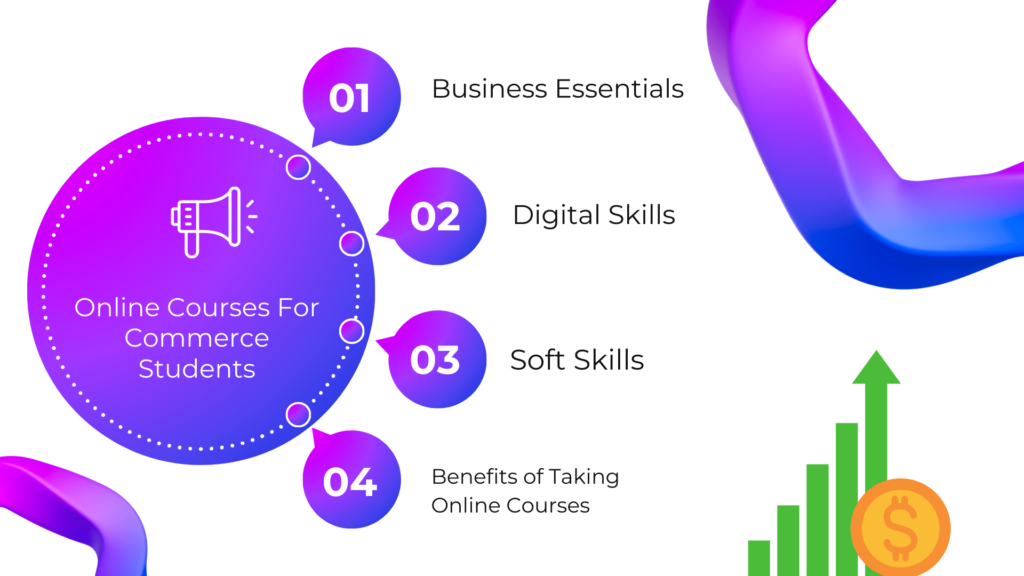Looking for the best online courses for commerce students? You’ve come to the right place! Our platform offers a wide selection of top-notch online courses tailored specifically for commerce students. With our meticulously curated curriculum, students can delve into various aspects of commerce, from finance and accounting to marketing and economics. Our commitment to excellence ensures that you receive the highest quality education to propel your career in commerce forward
Enroll in our best online courses for commerce students and gain access to comprehensive learning materials designed to enhance your understanding of key commerce concepts. Whether you’re a beginner looking to grasp the fundamentals or a seasoned professional aiming to refine your skills, our courses cater to learners at every stage. With flexible scheduling and self-paced modules, you can conveniently fit your studies around your busy lifestyle while still receiving top-tier education.
Unlock your potential with the best online courses for commerce students available on our platform. Our expert instructors bring years of industry experience to the virtual classroom, providing invaluable insights and practical knowledge that you can apply in real-world scenarios. From interactive lectures to hands-on assignments, our courses are designed to foster active learning and skill development, ensuring that you emerge as a confident and competent commerce professional.
Don’t settle for anything less than the best when it comes to your commerce education. Join thousands of satisfied students who have embarked on their learning journey with our esteemed platform. With our best online courses for commerce students, you’ll gain the knowledge, skills, and credentials needed to thrive in today’s competitive business landscape. Take the first step towards a successful career in commerce and enroll in our courses today!
Table of Contents
Types of Online Courses for Commerce Students

Business Essentials: Essential Online Courses For Commerce Students
Accounting
Accounting is the foundation of the financial world, the language of business, and a crucial skill for commerce students. In essence, accounting is the process of recording, classifying, summarizing, and analyzing financial transactions of a business.
Here’s a breakdown of what accounting entails:
- Tracking financial activity: This involves recording every penny coming in (revenue) and going out (expenses).
- Financial statements: Accountants prepare reports that summarize a company’s financial health, including the balance sheet, income statement, and cash flow statement.
- Data analysis: Accountants analyze financial data to identify trends, assess financial performance, and make informed business decisions.
- Essential for most business careers: Understanding accounting principles is beneficial for various roles in finance, sales, marketing, and even management.
- Solid foundation for business analysis: Accounting skills equip you to analyze financial data and make sound business decisions.
- Compliance and legal requirements: Businesses must adhere to accounting standards for tax filing and reporting purposes.
| Course Name | Accounting Fundamentals for Commerce Students |
|---|---|
| Platform | Udemy, Coursera, edX, Khan Academy, etc. |
| Duration | Typically ranges from 4 weeks to 12 weeks depending on the depth |
| Level | Beginner to Intermediate |
| Prerequisites | Basic understanding of mathematics and commerce principles |
| Course Content | – Introduction to accounting principles and concepts |
| – Double-entry bookkeeping | |
| – Recording transactions and journal entries | |
| – Preparation of financial statements (Income Statement, Balance Sheet, Cash Flow Statement) | |
| – Analysis of financial statements | |
| – Introduction to managerial accounting | |
| – Cost concepts and cost behavior | |
| – Budgeting and variance analysis | |
| – Introduction to accounting software | |
| Teaching Methods | Video lectures, quizzes, assignments, interactive exercises |
| Instructor | Experienced accounting professionals or educators |
| Certification | Some platforms offer a certificate of completion |
| Cost | Can range from free to a few hundred dollars for premium courses |
| Additional Resources | Supplementary reading materials, discussion forums, Q&A sessions |
| Career Benefits | Improved understanding of financial concepts for commerce-related roles, enhanced resume |
Finance
Finance is the lifeblood of any business, and for commerce students, understanding its core principles is essential. It encompasses the management of money, credit, and investments to achieve financial goals.
Here’s a breakdown of key areas in finance:
- Financial Management: This involves planning, budgeting, and controlling a company’s financial resources to maximize profits and shareholder value.
- Investments: This deals with analyzing and selecting assets like stocks, bonds, and real estate to grow wealth over time.
- Risk Management: This focuses on identifying, assessing, and mitigating financial risks faced by a business.
- Financial Markets: This refers to the platforms where financial instruments like stocks, bonds, and derivatives are traded.
- Understanding Business Decisions: Financial knowledge allows you to evaluate the financial implications of business decisions.
- Career Opportunities: Finance opens doors to exciting careers in banking, investment banking, financial planning, and more.
- Personal Finance Management: Financial literacy empowers you to make informed decisions regarding your own money.
| Course Name | Finance Essentials for Commerce Students |
|---|---|
| Platform | Udemy, Coursera, edX, Khan Academy, etc. |
| Duration | Typically ranges from 4 weeks to 12 weeks depending on the depth |
| Level | Beginner to Intermediate |
| Prerequisites | Basic understanding of mathematics and commerce principles |
| Course Content | – Introduction to financial markets and institutions |
| – Time value of money and discounted cash flow analysis | |
| – Financial statement analysis | |
| – Capital budgeting and investment analysis | |
| – Risk and return in financial markets | |
| – Introduction to financial derivatives | |
| – Corporate finance principles and decision-making | |
| – Personal finance and investment strategies | |
| Teaching Methods | Video lectures, quizzes, assignments, interactive exercises |
| Instructor | Experienced finance professionals or educators |
| Certification | Some platforms offer a certificate of completion |
| Cost | Can range from free to a few hundred dollars for premium courses |
| Additional Resources | Supplementary reading materials, discussion forums, Q&A sessions |
| Career Benefits | Enhanced understanding of financial principles for commerce-related roles, improved decision-making abilities, enhanced resume |
Marketing
Marketing is the engine that drives sales and brand awareness. For commerce students, mastering marketing principles equips them to understand customer needs, promote products effectively, and create successful business strategies. Marketing is the process of creating, communicating, delivering, and exchanging offerings that hold value for customers, clients, partners, and society at large [American Marketing Association].
In simpler terms, it’s all about:
- Identifying your target audience: Who are you trying to reach with your product or service?
- Understanding customer needs and wants: What problems do your products solve, or what desires do they fulfill?
- Developing a compelling message: How will you communicate the value proposition of your offering?
- Choosing the right marketing channels: Reaching your audience through the most effective channels (social media, advertising, etc.)
- Building relationships with customers: Creating loyalty and fostering positive brand experiences.
- Foundation for Business Success: Marketing is a core function of any business, and understanding it is crucial for success.
- Diverse Career Paths: A marketing degree opens doors to exciting careers in advertising, brand management, social media marketing, and more.
- Data-Driven Decision Making: Marketing involves analyzing customer data to make informed decisions about product development and promotion strategies.
- Communication and Creativity: Marketing requires strong communication skills and the ability to create compelling messages that resonate with your target audience.
| Course Name | Marketing Fundamentals for Commerce Students |
|---|---|
| Platform | Udemy, Coursera, edX, Khan Academy, etc. |
| Duration | Typically ranges from 4 weeks to 12 weeks depending on the depth |
| Level | Beginner to Intermediate |
| Prerequisites | Basic understanding of business principles and consumer behavior |
| Course Content | – Introduction to marketing principles and concepts |
| – Market segmentation and targeting | |
| – Branding and positioning strategies | |
| – Marketing research methods and data analysis | |
| – Product development and lifecycle management | |
| – Pricing strategies and tactics | |
| – Distribution channels and retailing | |
| – Promotional strategies (advertising, sales promotion, public relations, digital marketing) | |
| Teaching Methods | Video lectures, quizzes, assignments, case studies |
| Instructor | Experienced marketing professionals or educators |
| Certification | Some platforms offer a certificate of completion |
| Cost | Can range from free to a few hundred dollars for premium courses |
| Additional Resources | Supplementary reading materials, discussion forums, Q&A sessions |
| Career Benefits | Enhanced understanding of marketing principles for commerce-related roles, improved marketing skills, enhanced resume |
Digital Skills: Must Do Online Courses For Commerce Students
Digital Marketing (SEO, SEM, Social Media Marketing)
In today’s digital age, a strong online presence is essential for any business. Commerce students who grasp digital marketing gain a powerful toolkit to reach customers, promote products, and drive sales in the online arena. This encompasses three key areas:
- Search Engine Optimization (SEO): The art and science of optimizing websites and content to rank higher in search engine results pages (SERPs) like Google. Commerce students with SEO skills can ensure a company’s website is easily discoverable by potential customers searching for relevant products or services.
- Search Engine Marketing (SEM): This involves paid advertising strategies like pay-per-click (PPC) campaigns to appear at the top of search engine results. Understanding SEM allows commerce students to create targeted online ads that reach the right audience at the right time.
- Social Media Marketing (SMM): Leveraging social media platforms like Facebook, Instagram, and Twitter to connect with customers, build brand awareness, and promote products. Commerce students with SMM expertise can engage audiences, create viral content, and drive traffic to a company’s website.
- Explosive Growth of E-commerce: The digital marketplace is booming, and commerce graduates with digital marketing skills are highly sought-after.
- Measurable Results: Digital marketing campaigns can be tracked and analyzed, allowing for data-driven decisions and continuous improvement.
- Reaching a Wider Audience: Social media and online advertising enable commerce students to connect with customers globally, expanding market reach.
- Staying Ahead of the Curve: Digital marketing is constantly evolving, and commerce students with these skills can adapt to new trends and technologies.
| Course Name | Digital Marketing Essentials |
|---|---|
| Platform | Udemy, Coursera, edX, HubSpot Academy, Google Digital Garage, etc. |
| Duration | Typically ranges from 4 weeks to 12 weeks depending on the depth |
| Level | Beginner to Intermediate |
| Prerequisites | Basic understanding of marketing principles |
| Course Content | – Introduction to digital marketing |
| – Website planning and development | |
| – Search engine optimization (SEO) | |
| – Content marketing and blogging | |
| – Social media marketing strategies | |
| – Email marketing tactics | |
| – Pay-per-click (PPC) advertising | |
| – Display advertising and remarketing | |
| – Analytics and performance tracking | |
| Teaching Methods | Video lectures, quizzes, practical exercises, case studies |
| Instructor | Experienced digital marketing professionals or educators |
| Certification | Some platforms offer a certificate of completion |
| Cost | Can range from free to a few hundred dollars for premium courses |
| Additional Resources | Supplementary reading materials, discussion forums, Q&A sessions, access to digital marketing tools and resources |
| Career Benefits | Enhanced understanding of digital marketing strategies and tactics, improved marketing skills, increased employability in digital marketing roles |
E-Commerce Fundamental
The rise of e-commerce has revolutionized how businesses operate and consumers shop. For commerce students, understanding e-commerce fundamentals is essential to navigate the exciting world of online commerce.
E-commerce, or electronic commerce, refers to the buying and selling of goods and services over the Internet. It encompasses a wide range of activities, from online retail stores to digital marketplaces.
| Course Name | E-Commerce Fundamentals |
|---|---|
| Platform | Udemy, Coursera, edX, LinkedIn Learning, etc. |
| Duration | Typically ranges from 4 weeks to 12 weeks depending on the depth |
| Level | Beginner to Intermediate |
| Prerequisites | Basic understanding of business principles and the internet |
| Course Content | – Introduction to E-Commerce |
| – Overview of online business models | |
| – Setting up an E-Commerce website | |
| – Understanding payment gateways and security | |
| – E-Commerce legal and regulatory considerations | |
| – Product sourcing and inventory management | |
| – Customer acquisition strategies | |
| – Conversion optimization and sales tactics | |
| – Fulfillment and logistics | |
| Teaching Methods | Video lectures, quizzes, case studies, practical exercises |
| Instructor | Experienced E-Commerce professionals or educators |
| Certification | Some platforms offer a certificate of completion |
| Cost | Can range from free to a few hundred dollars for premium courses |
| Additional Resources | Supplementary reading materials, discussion forums, Q&A sessions |
| Career Benefits | Enhanced understanding of E-Commerce principles and strategies, improved skills for starting or managing an online business, increased employability in E-Commerce roles |
Data Analysis & Visualization
In today’s data-driven world, the ability to extract insights from information is a powerful asset. For commerce students, mastering data analysis and visualization transforms them into valuable decision-makers.
- Data Analysis: This involves collecting, cleaning, organizing, and interpreting data to uncover patterns, trends, and relationships. It equips commerce students to answer key business questions and make informed decisions.
- Data Visualization: This translates complex data sets into visually compelling formats like charts, graphs, and dashboards. Effective data visualization allows commerce students to communicate insights clearly and persuasively.
- Informed Decision-Making: Analyzing data allows commerce students to make data-driven decisions rather than relying on intuition or guesswork.
- Identifying Market Trends: Data analysis helps uncover consumer behavior patterns and emerging market trends, enabling businesses to adapt their strategies.
- Optimizing Marketing Campaigns: Data visualization tools help track campaign performance and optimize marketing strategies for better results.
- Enhanced Communication Skills: Effective data visualization enables commerce students to communicate complex information to a wider audience in a clear and concise way.
- Marketing Analytics: Analyzing customer data to personalize marketing campaigns and improve customer targeting.
- Financial Analysis: Utilizing data to assess financial performance, identify risks, and make informed investment decisions.
- Supply Chain Management: Analyzing data to optimize inventory management, logistics, and forecasting.
| Course Name | Data Analysis & Visualization Essentials |
|---|---|
| Platform | Udemy, Coursera, edX, DataCamp, LinkedIn Learning, etc. |
| Duration | Typically ranges from 4 weeks to 12 weeks depending on the depth |
| Level | Beginner to Intermediate |
| Prerequisites | Basic understanding of statistics and familiarity with spreadsheet software |
| Course Content | – Introduction to data analysis and visualization |
| – Data cleaning and preprocessing techniques | |
| – Exploratory data analysis (EDA) | |
| – Statistical analysis methods (descriptive statistics, hypothesis testing) | |
| – Introduction to data visualization tools (e.g., matplotlib, seaborn, Tableau) | |
| – Creating effective visualizations for different data types | |
| – Interpretation of visualized data and communicating insights | |
| – Introduction to machine learning concepts for predictive analysis | |
| Teaching Methods | Video lectures, hands-on exercises, coding assignments, quizzes |
| Instructor | Experienced data analysts or educators |
| Certification | Some platforms offer a certificate of completion |
| Cost | Can range from free to a few hundred dollars for premium courses |
| Additional Resources | Supplementary reading materials, discussion forums, Q&A sessions |
| Career Benefits | Enhanced understanding of data analysis techniques, improved skills for data-driven decision-making, increased employability in data analysis roles |
Soft Skills: Skill Builder Online Courses For Commerce Students
Communication Skills
The ability to communicate effectively is a cornerstone of success in any field, and especially so for commerce students. Strong communication skills empower you to:
- Articulate complex ideas with clarity: Whether it’s presenting a business proposal to investors, negotiating a deal with a client, or writing a persuasive marketing copy, clear and concise communication is key.
- Build strong relationships: Commerce often involves collaboration with colleagues, clients, and partners. Effective communication fosters trust, understanding, and collaboration.
- Become a persuasive leader: The ability to present ideas confidently and convincingly is crucial for influencing others and leading teams toward achieving goals.
- Verbal Communication: This includes clear and confident speaking, active listening, and the ability to tailor your communication style to different audiences.
- Written Communication: Strong writing skills are essential for crafting compelling emails, reports, proposals, and marketing materials.
- Nonverbal Communication: Body language, eye contact, and overall presentation play a significant role in conveying your message and professionalism.
- Increased Employability: Employers highly value strong communication skills across all industries. Having this edge makes you a more attractive candidate.
- Career Advancement: Effective communication is crucial for leadership roles and career progression in the commerce field.
- Building Trust and Confidence: Clear communication fosters trust with colleagues, clients, and stakeholders, leading to stronger business relationships.
| Week | Topics Covered |
|---|---|
| Week 1 | Introduction to Communication in Commerce |
| – Importance of communication skills in commerce | |
| – Types of communication in business | |
| – Communication challenges in the commerce sector | |
| Week 2 | Verbal Communication Skills |
| – Effective public speaking techniques | |
| – Presentation skills for commerce students | |
| – Tips for participating in meetings and group discussions | |
| – Networking strategies for commerce professionals | |
| Week 3 | Written Communication Skills |
| – Basics of business writing | |
| – Crafting professional emails and memos | |
| – Writing reports and business documents | |
| – Strategies for clear and concise communication | |
| Week 4 | Interpersonal Communication Skills |
| – Building rapport and relationships in business | |
| – Active listening techniques | |
| – Conflict resolution skills | |
| – Negotiation skills for commerce professionals | |
| Week 5 | Ethical and Professional Communication |
| – Importance of ethics in business communication | |
| – Maintaining professionalism in all communication | |
| – Cultural sensitivity and diversity in communication | |
| Week 6 | Practical Applications and Case Studies |
| – Role-playing exercises for real-life communication | |
| – Analysis of communication strategies in business case studies | |
| – Guest lectures from industry professionals sharing their communication experiences |
Teamwork & Collaboration
The business world thrives on collaboration. For commerce students, mastering teamwork and collaboration skills equip them to navigate complex projects, achieve shared goals, and become valuable team players.
- Teamwork: Working together with a group of individuals towards a common objective. It involves sharing responsibilities, leveraging diverse skillsets, and fostering a sense of shared accountability.
- Collaboration: This goes beyond simply working together. It involves open communication, active listening, mutual respect, and a willingness to compromise to achieve an optimal outcome.
- Real-World Relevance: Most business endeavors involve collaboration across different departments and teams. Understanding how to work effectively in a team setting is crucial for success.
- Problem-Solving: Diverse perspectives and skillsets combine in a team environment, leading to more creative and effective solutions to complex business problems.
- Project Management: Teamwork fosters leadership skills and the ability to delegate tasks, manage deadlines, and ensure smooth project execution.
- Building Relationships: Collaboration fosters strong professional relationships with colleagues and helps build a network of connections within the industry.
- Marketing: Developing successful marketing campaigns often requires collaboration between marketing, sales, and creative teams.
- Finance: Financial planning, risk management, and investment decisions often involve teamwork between financial analysts, portfolio managers, and other professionals.
- Operations: Ensuring smooth production, logistics, and supply chain management requires effective collaboration across various operational teams.
| Week | Topics Covered |
|---|---|
| Week 1 | Introduction to Teamwork & Collaboration |
| – Importance of teamwork in professional settings | |
| – Benefits of effective collaboration | |
| – Overview of key teamwork concepts and theories | |
| Week 2 | Understanding Team Dynamics |
| – Types of teams and their characteristics | |
| – Stages of team development | |
| – Roles and responsibilities within teams | |
| – Strategies for building trust and cohesion | |
| Week 3 | Communication within Teams |
| – Importance of effective communication in teams | |
| – Clear and concise team communication | |
| – Active listening and feedback mechanisms | |
| – Handling conflicts and resolving disagreements | |
| Week 4 | Collaboration Tools and Technologies |
| – Introduction to collaboration platforms and software | |
| – Project management tools for team collaboration | |
| – Remote teamwork strategies and best practices | |
| – Security and privacy considerations in collaboration tools | |
| Week 5 | Leadership in Team Settings |
| – Different leadership styles and their impact on teams | |
| – Empowering team members and fostering autonomy | |
| – Delegating tasks effectively within teams | |
| – Handling team challenges and promoting resilience | |
| Week 6 | Building Effective Teams |
| – Recruiting and selecting team members | |
| – Training and development for team effectiveness | |
| – Recognizing and leveraging team strengths | |
| – Evaluating team performance and providing feedback |
Time Management & Self-Discipline
Juggling academics, extracurricular activities, and a social life can be a challenge for any student. For commerce students, developing strong time management and self-discipline is crucial for academic success and future career preparedness.
- Time Management: This involves planning, organizing, and prioritizing your tasks to make the most of your time. It’s about utilizing effective strategies to ensure you complete your work efficiently and meet deadlines.
- Self-Discipline: This is the ability to control your impulses and stick to your plans, even when faced with distractions or temptations. It’s the willpower to prioritize your goals and follow through on your commitments.
- Academic Success: Effective time management allows you to stay on top of your coursework, prepare for exams efficiently, and manage deadlines effectively.
- Reduced Stress: Feeling organized and in control of your schedule reduces stress and anxiety, allowing you to focus on your studies and perform your best.
- Increased Productivity: By prioritizing tasks and minimizing distractions, you can get more done in less time, freeing up time for other pursuits.
- Developing Valuable Habits: Strong time management and self-discipline are transferable skills that benefit you throughout your career and personal life.
- Create a Schedule and Stick to It: Develop a daily or weekly schedule that allocates time for classes, studying, assignments, leisure activities, and sleep. Be realistic and plan for buffer time.
- Set SMART Goals: Set Specific, Measurable, Achievable, Relevant, and Time-bound goals. This helps you stay focused and track your progress.
- Minimize Distractions: Identify distractions like social media or unnecessary phone use, and develop strategies to minimize them while studying.
- Learn to Say No: Don’t overload your schedule. Don’t be afraid to politely decline commitments that will hinder your ability to manage your time effectively.
- Reward Yourself: Celebrate your achievements, big or small! This will motivate you to stay on track and reach your goals.
| Week | Topics Covered |
|---|---|
| Week 1 | Introduction to Time Management & Self-Discipline |
| – Importance of effective time management | |
| – Benefits of self-discipline in achieving goals | |
| – Overview of key concepts and principles | |
| Week 2 | Goal Setting and Prioritization |
| – Setting SMART goals | |
| – Prioritizing tasks and activities | |
| – Differentiating between urgent and important tasks | |
| – Creating action plans | |
| Week 3 | Time Tracking and Analysis |
| – Methods for tracking time | |
| – Identifying time wasters and distractions | |
| – Analyzing time usage patterns | |
| – Adjusting schedules for optimal productivity | |
| Week 4 | Effective Planning Techniques |
| – Using productivity tools and techniques | |
| – Creating daily, weekly, and long-term plans | |
| – Time blocking and batching tasks | |
| – Incorporating buffer time for flexibility | |
| Week 5 | Overcoming Procrastination |
| – Understanding the root causes of procrastination | |
| – Strategies for overcoming procrastination | |
| – Breaking tasks into manageable steps | |
| – Cultivating motivation and discipline | |
| Week 6 | Maintaining Self-Discipline |
| – Developing habits for consistency | |
| – Managing stress and avoiding burnout | |
| – Practicing self-care and wellness techniques | |
| – Reflecting on progress and adjusting strategies |
Benefits of Taking Online Courses
- Enhance knowledge and skills in specific areas.
- Gain industry-relevant certifications.
- Improve employability and career prospects.
- Fit learning around your existing schedule.
- Learn from industry experts across the globe.
Tips for Choosing the Right Online Course
- Identify your learning goals and career aspirations.
- Research course providers and their reputation.
- Consider factors like course format (video lectures, live sessions, assignments), cost, and accreditation.
- Read reviews from past students.
Conclusion
- Upskilling: Gain in-demand skills like digital marketing, data analysis, and e-commerce to stay competitive.
- Flexibility: Learn at your own pace and schedule, fitting coursework around existing commitments.
- Industry Expertise: Access instruction from industry professionals and gain valuable real-world insights.
- Career Advancement: Enhance your resume and open doors to exciting new career paths.
- Cost-Effective: Online courses can be a more affordable alternative to traditional education.
- Variety of Options: Choose from a wide range of courses to target specific areas of interest.
FAQ’s
- Are online courses as valuable as traditional degrees in commerce?
- Online courses can be a valuable complement to a commerce degree, but they may not replace it entirely. While online courses can equip you with specific skills, a degree program provides a broader foundation in commerce principles. The best approach might be to combine a commerce degree with relevant online courses to gain a competitive edge.
- How do I choose the right online course platform?
- There are many online learning platforms offering commerce-related courses. Consider factors like your budget, learning style (video lectures, interactive exercises), course accreditation, and instructor credentials when making your decision. Popular platforms include Coursera, edX, Udemy, and Future Learn. You can also explore options offered directly by universities or industry organizations.
- How much time do I need to dedicate to online courses?
- The time commitment for online courses varies depending on the platform, course length, and your learning pace. Some courses offer flexible structures, while others may have deadlines and scheduled sessions. Look for information about the expected time commitment before enrolling in a course.
- Can I get certified through online courses?
- Many online courses offer certificates upon completion. These certificates can showcase your newly acquired skills to potential employers. However, the value of the certificate depends on the reputation of the platform and the course itself. Some employers may prioritize certifications from accredited institutions.
- What are some free online courses available for commerce students?
- Several online platforms offer free introductory courses or even full specializations related to commerce. Look for options on platforms like Coursera, edX, or YouTube channels from universities or industry experts. While free courses might not offer certificates, they can be a great way to explore a topic before committing to a paid course.
Read More
- Guidewire Online Course: Your Key to a Successful Developer’s Career (9 Courses)
- All Degree courses list for MPC (PCM) Students After the 12th.
- 5 Benefits of IIT Patna Online Courses for Career Growth
- ISRO Online Course for Students / Free Courses With Certificate
- Don’t Miss these Best Government Free Online Courses With Certificates 2024
- Best ITI Courses After 12TH: Course Duration & Job Opportunities
- Don’t Miss Best IIT Courses After 12th
- Unlock Lucrative Career Paths with High Salary Courses after 12th Science




I saw a lot of website but I think this one has something special in it in it
What i don’t realize is if truth be told how you are now not really a lot more neatly-preferred than you might be right now. You’re very intelligent. You recognize thus considerably in relation to this subject, made me individually imagine it from a lot of varied angles. Its like men and women are not fascinated unless it’s something to do with Lady gaga! Your individual stuffs great. Always deal with it up!